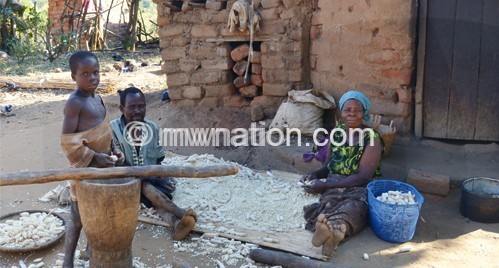Covid-19 chokes food Systems, livelihoods
The Agriculture Policy Research in Africa (Apra) says the Covid-19 pandemic has affected rural livelihoods as many households went to bed without food while farmers with produce had difficulties accessing markets.
In its report titled Impact of Covid-19 on Food Systems and Rural Livelihoods in Malawi, Apra indicates that about 60 percent of farmers reported a decline in business activities, which means they could not raise enough income for their livelihoods.
The report is based on the stratified random sample of 114 household heads (32 female and 82 male) drawn from an Apra household survey of groundnut producers in Mchinji and Ntchisi districts and other key informant interviews.

Reads the report in part: “About 31 percent of respondents reported spending an entire day without eating due to lack of money and
other resources.
“There had been an increase in the cost of transport of farm produce as well as a significant decline in the number of traders coming to villages.”
More worrisome is that farmers reported a significant decline in the availability of extension services and 70 percent mentioned a lack of credit facilities, which is likely to affect the outcome of the upcoming 2020/21 farming season.
While slightly more than half of respondents reported no change in the availability of land for rent and farm inputs, they said costs had escalated for close to 40 percent of participants since the crisis began.
“About 60 percent reported a decline in business activities. Access to off-farm work was limited at 44 percent and 24 percent within and outside the village, respectively,” reads the report.
The report comes after the first-ever brief report of the Malawi High-Frequency Phone Survey Covid-19 (Hfps Covid-19) revealed that prevalence of severe and moderate or severe food insecurity was high.
It reads: “The prevalence of (i) severe and (ii) moderate or severe food insecurity, based on the food insecurity experience scale, among adult population is high throughout Malawi, though more pronounced in rural areas.”
It says the prevalence of moderate or severe food insecurity is highest among adults living in households in the poorest wealth quintile (86 percent).
When presenting the 2020/21 National Budget on September 11, Minister of Finance Felix Mlusu said the pandemic has threatened livelihoods of the peri-urban vulnerable and ultra-poor by potentially exposing them to massive disruption.
“With support from development partners, government has developed a peri-urban emergency cash transfer response to cushion the peri-urban population from the socio-economic effects of the pandemic,” he said.
Mlusu said the intervention is expected to target the peri-urban areas in Mzuzu, Lilongwe, Blantyre and Zomba covering about 172 337 households, each receiving K35 000 a month.






One Comment